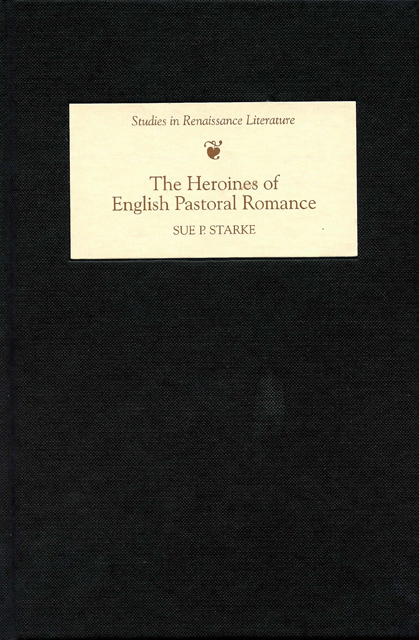Book contents
- Frontmatter
- Contents
- Acknowledgements
- Abbreviations
- Chapter 1 The Pastoral Romance Heroine in English Renaissance Literature
- Chapter 2 The Arcadian Prison: Chastity and the Defense of the Princesses in Sidney's Two Arcadias
- Chapter 3 Spenser's Romance Heroines: The Heroic and the Pastoral in Books 3 and 6 of The Fairie Queene
- Chapter 4 Growing Out of Pastoral: Wroth's Urania and the Female Pastoral Career
- Chapter 5 Fletcher's Clorin and Milton's Lady: The Performance of Chastity in Pastoral Drama
- Chapter 6 Milton's Eve and Marvell's Maria Fairfax: Wives and Daughters in the Pastoral Family Circle
- Bibliography
- Index
Chapter 2 - The Arcadian Prison: Chastity and the Defense of the Princesses in Sidney's Two Arcadias
Published online by Cambridge University Press: 10 March 2023
- Frontmatter
- Contents
- Acknowledgements
- Abbreviations
- Chapter 1 The Pastoral Romance Heroine in English Renaissance Literature
- Chapter 2 The Arcadian Prison: Chastity and the Defense of the Princesses in Sidney's Two Arcadias
- Chapter 3 Spenser's Romance Heroines: The Heroic and the Pastoral in Books 3 and 6 of The Fairie Queene
- Chapter 4 Growing Out of Pastoral: Wroth's Urania and the Female Pastoral Career
- Chapter 5 Fletcher's Clorin and Milton's Lady: The Performance of Chastity in Pastoral Drama
- Chapter 6 Milton's Eve and Marvell's Maria Fairfax: Wives and Daughters in the Pastoral Family Circle
- Bibliography
- Index
Summary
In both versions of Sir Philip Sidney's Arcadia, the first pastoral romance in English, the royal sisters Pamela and Philoclea are double heroines, offering two contrasting models of the ideal young gentlewoman. Pamela, variously described as “noble,” “wise,” “virtuous,” and “disdaining,” and Philoclea, whose epithets include “amiable,” “sweet-minded,” and “gentle,” provide the reader with examples of how, and how not, to manage the perils of feminine erotic maturation. Sidney's characterization of the sisters has been seen as a rhetorical exercise in antithesis. According to this line of thinking, the reader is not required to judge their comparative merits but only to admire them: in the words of C.S. Lewis, each girl “can be praised without reservation.” S eventeen-year-old Pamela's greater strength of mind is attributed to her one year age advantage over her sister. Such strength, however, is thrown into relief by her younger sister's inadequacies, charming as they may be. Those inadequacies are due less to age, I would argue, than to the particular model of femininity Philoclea embodies. I suggest that Sidney's portrayal of the two sisters does in fact ask us not only to distinguish, but to judge between two different models of femininity. For each girl, the attainment of maturity is synonymous with the development of a sense of self-possession or self-entitlement. This evolving sense is manifested primarily through lyric moments in which the girls meditate upon the changes love has wrought in their lives and in their hearts. Together, the 1580 and the 1590 versions of Sidney's Arcadian romance construct a specifically feminine ideal of maturity in which the two crucial Renaissance feminine virtues of silence and obedience prove to be ineffective means of preserving the third, chastity.
The difficult achievement of self-possession is a problem for all lovers in Sidney's pastoral, for the experience of love here serves as the crucible of selftransformation. Within the narrative, passion has a disordering effect, causing the ducal family to disintegrate as the girls’ parents pursue their own erotic imperatives. Sidney's portrayal of the effects of passion calls into question Tasso's valuation of love as a “noble habit of the will,” a manageable emotion which, within the context of the heroic romance, can serve as a form of selfimprovement.
- Type
- Chapter
- Information
- The Heroines of English Pastoral Romance , pp. 41 - 85Publisher: Boydell & BrewerPrint publication year: 2007



